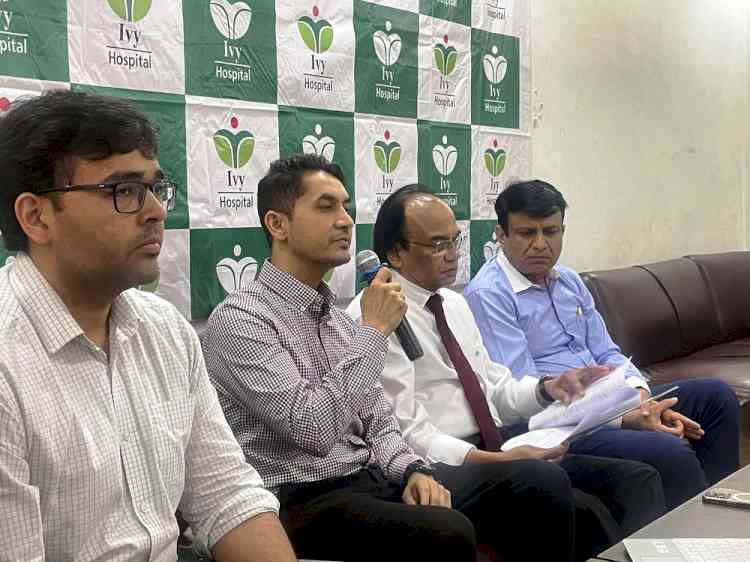65 cleft lip and palate children operated at DMC & Hospital
Author(s): City Air Newsphoto: city air news Ludhiana, December 10, 2016: 65 cleft lip and palate children who were operated in recent past at DMC & Hospital, along with their parents and relatives participated in the cleft week concluding...


photo: city air news
Ludhiana, December 10, 2016: 65 cleft lip and palate children who were operated in recent past at DMC & Hospital, along with their parents and relatives participated in the cleft week concluding function held at Dumra Auditorium . Presiding over the function , Dr Sandeep Puri , Principal praised the combined effort of Smile Train and Department. Of Plastic Surgery DMCH for successfully implementing the mission of creating Smiles on the faces of cleft children . He thanked Mr Prem Kumar Gupta , Secretary of the DMCH Managing Society for waiving off the hospital charges in all these cases . Dr Ashwani Chaudhary , Medical Supdt . DMCH requested the parents to become the ambassadors and identify such cases in population at large and refer them to DMCH for free treatment .
Dr Sanjeev Uppal , HOD Plastic Surgrey and Lead Surgeon of Smile Train told that the consultants from Plastic Surgery , Anaesthesia, Critical Care and Paediatrics were continuously involved in the special care being provide to the cleft children . A special awareness week was celebrated to propagate the message of free operations being conducted for all cleft patients at DMC & H . Cleft lip and cleft palate are facial and oral malformations that occur very early inpregnancy, while the baby is developing inside the mother. Clefting results when there is not enough tissue in the mouth or lip area, and the tissue that is available does not join together properly he added . In most cases, the cause of cleft lip and cleft palate is unknown. These conditions cannot be prevented. Most scientists believe clefts are due to a combination of genetic and environmental factors. There appears to be a greater chance of clefting in a newborn if a sibling, parent, or relative has had the problem.
Another potential cause may be related to a medication a mother may have taken during her pregnancy. Some drugs may cause cleft lip and cleft palate. Among them: anti-seizure/anticonvulsant drugs, acne drugs containing Accutane, and methotrexate, a drug commonly used for treating cancer, arthritis, and psoriasis.
Dr Rajinder Mittal , Professor of Plastic Surgery briefed that Cleft lip and cleft palate can occur on one or both sides of the mouth. Because the lip and the palate develop separately, it is possible to have a cleft lip without a cleft palate, a cleft palate without a cleft lip, or both together. He added that cleft lip, with or without cleft palate, affects one in 700 babies annually, and is the fourth most common birth defect in the U.S. Clefts occur more often in children of Asian, Latino, or Native American descent. Compared with girls, twice as many boys have a cleft lip, both with and without a cleft palate. However, compared with boys, twice as many girls have cleft palate without a cleft lip.
Dr Ramneesh Garg , Associate Professor said that Children with cleft palate are at increased risk of ear infections since they are more prone to fluid build-up in the middle ear. If left untreated, ear infections can causehearing loss. To prevent this from happening, children with cleft palate usually need special tubes placed in the eardrums to aid fluid drainage, and their hearing needs to be checked once a year. The health care team works together to develop a plan of care to meet the individual needs of each patient. Treatment usually begins in infancy and often continues through early adulthood.
Ms Sanjana Sikri , North India Co-ordinator from Smile Train appreciated the most modern facilities being provided to these children for surgery pre and post operative care . She said that although treatment for a cleft lip and/or cleft palate may extend over several years and require several surgeries depending upon the involvement, most children affected by this condition can achieve normal appearance, speech, and eating. Commenting on the genetic link , Dr Sheerin Shah, Asstt. Professor said that The risk of having a child with a cleft lip or palate is slightly increased if you've had a child with the condition before, but the chances of this happening are thought to be around 2-8%. If either you or your partner were born with a cleft, your chance of having a baby with a cleft is also around 2-8%. Most children of parents who had a cleft will not be born with a cleft. The chances of another child being born with a cleft or of a parent passing the condition to their child can be higher in cases related to genetic conditions.

 cityairnews
cityairnews 














